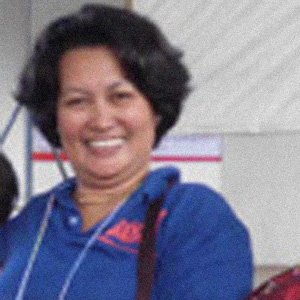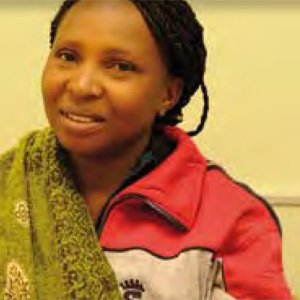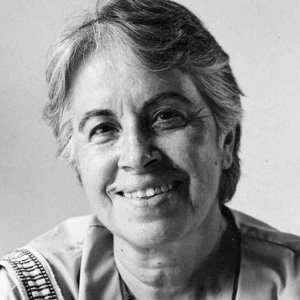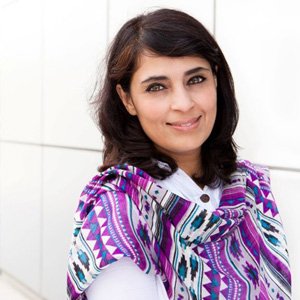2014
THE WOMEN HAVE WINGS AWARDS
Madhavi Kuckreja
India
Madhavi Kuckreja helped start Vanangana in eastern Uttar Pradesh (UP) in the 1990s, a violently feudal part of the country. Over the past two decades Vanangana has worked with Muslim and Dalit (“untouchable”) women to build their capacities to confront the routinized violence they have historically experienced.
In eastern UP, Dalit/Muslim women are subject to gendered violence within the home, often overlaid by violence meted out by a caste elite and by the state, particularly the police. Taking on patriarchy-induced violence within these three, overlapping domains has often led to a fearsome backlash, and it has taken immense courage for these rural, marginalized women to stand their ground. Vanangana has made extensive use of theatre to force discussions around such violence, within both the household and the larger community it is situated in. By building a cadre of dalit women hand-pump mechanics (to repair frequently broken down hand-pumps or water spouts), Vanangana has forced upper caste communities to allow these “untouchable” women access to water sources they would normally be barred from accessing.
Innovation, courage and persistence have been the hallmark of Vanangana’s work. These cultures of violence will not change overnight, but at least in the two districts that Vanangana works in, victims of violence have recourse to institutional and legal support, and perpetrators of violence have found it a little harder to evade responsibility. Madhavi has been an inspirational figure for the Vanangana staff, and for many other women’s organizations working on the question of violence against women. She has now moved to Santatkada, in Lucknow, in an attempt to have Vanangana managed and run by locally rooted leadership.
Asmaa Tarek
Egypt
As a young girl growing up in Egypt pre-revolution, Asmaa Tarek saw many girls pulled out of school at an early age to get married or simply because educating girls was seen as a waste of time. Asmaa knew this was unfair, and as the revolution grew momentum, she saw women play a key role in fighting for justice. “It is a very exciting time to be a young woman in Egypt,” says Asmaa, “because during the revolution women and men stood side-by-side fighting for our rights. Gender equality had just been born, but I believe perhaps we can experience it fully in the future.”
After graduating from the faculty of law, and obtaining a diploma in human rights and civil society, Asmaa established the first youth-led formal organization in her community, “Pioneers of Development,” to promote youth civic engagement and participation. She was the only female among the founders of the organization. She now works to ensure that male and female youth alike have the knowledge and access to make their voices heard in their communities and nation. “For me, the sky is the limit,” Asmaa says. “I dream of becoming an activist to be the voice of all women who are silenced, not only in Egypt, but all over the world.”
Hope V. Hervilla
Philippines
Since childhood Hope V. Hervilla has seen the dark side of globalization and violence in the Philippines. She walked to school barefoot after selling eggs and cigarettes in her nation’s ports and toiled in banana plantations to earn her way through college. Her dream is to see her people free from poverty and oppression and free to chart their own destiny.
Hope speaks out as a journalist and activist in one of the most deadly countries to be a journalist in the world. Sadly, in 2009 two of her women colleagues were killed in the largest massacre of journalists in recorded history. For her, the risks she faces by speaking out are outweighed by the risks of continued silence. For this reason, last year, Hope was invited to run for Congress in the Philippines as the only woman on the opposition platform. She decided to do it, saying that “being a leader means having a big heart for compassion and a courageous heart to battle against all forms of discrimination and oppression.” Though her party lost the election, she is considering running again and she tells us, “I left footprints of a real politics of change with every handshake and smile I gave.”
Hope is a social worker by trade and a tireless activist in practice. After obtaining her college degree, she taught social work at the university level, focusing on social issues and women’s advocacy. She taught for many years but her political activism put her at odds with the university’s philosophy. Thus, she decided to resign and focus on social and environmental justice work. In 2006, she founded Save Our Lives, SOS! – Panay and Guimaras immediately following the worst oil spill in the Philippines’ history. SOS is an alliance of women activists, human rights groups, local legislators, scientists, lawyers, academics, and victims of the spill who came together to respond to the damage done to the area’s land and livelihoods. This coalition of victims and advocates has grown into a permanent organization committed to empowering communities, especially women and children, to demand economic and environmental justice and accountability from the government and corporations in light of several overwhelming natural and man-made disasters affecting the area in the past few years, including the oil spill and the devastation left by Typhoon Haiyan/Yolanda last year.
In the wake of Typhoon Haiyan, with the Philippines government struggling to assist survivors of the devastation, Hope did what came naturally to her: Along with her husband, she stepped up to organize relief efforts in her hometown. Hope is an exemplary example of a courageous, determined woman who puts all of her efforts into creating change and a brighter future for her community and her country.
Adeline Nsimire
DRC
Adeline Nsimire’s work has brought hope and life to hundreds of women in South and now also North Kivu that had born the brunt of war, poverty, sexual violence and discrimination. What’s remarkable about her achievements is the fact that it has been done with minimal resources in an area that is still conflict-ridden and therefore highly risky for women. Nsimire is a true force of nature for the women in Eastern Congo. She knows that the power of sisterhood, education and empowerment for women is key to bringing peace and an end to violence against women in one of the worst regions of the world. Upon learning about Nsimire’s work and the other women she met on the Women of Congo Speak Out delegation, Nobel peace Laureate Leymah Gbowee said: “Thy say that the DRC is the rape capital of the world, but what I see is that it is the capital of strong women and solidarity among women, it’s the capital of sisterhood.”
Alba Stella Barreto
Colombia
In Cali, Colombia, a group of women from the District of Aguablanca is helping to bring peace and justice to one of the country’s poorest and most violent urban areas. Using skills and information disseminated through a network of weekly meetings, local women assist local residents both by providing a range of essential services – from mediation to adult education – and by referring residents to other service providers and resources in the community. This group, which is strikingly community-based, female, well-led, disciplined, and holistic, is now being touted as a model for communities elsewhere in Colombia. Communities, policy-makers and restorative justice advocates – both in Colombia and abroad – can learn much from their approach to restorative justice, and more broadly, from their network-based approach to governing ungoverned spaces. Much of the debate about the conflict in Colombia focuses on national events and neglects the efforts of local communities to nurture peace and justice in their immediate environment. The Aguablanca program demonstrates that local initiatives can make a big difference in the lives of ordinary Colombians. To replicate the success of this program in communities elsewhere, however, it will be necessary to identify local citizens who can provide the same leadership and commitment as the women of Aguablanca.
Samar Minallah Khan
Pakistan
The practice of swara, wherein girls are given as compensation to end disputes—from murder to property quarrels—had been practiced openly and legally in Pakistan for generations. In 2003, Samar Minallah Khan, a Pakistani Pashtun documentary filmmaker, freelance journalist, human rights activist, and anthropologist created a documentary on swara to raise the profile of the custom and persuade policymakers to recognize the problem and eliminate it.
As a direct result of Samar’s campaign, the practice of swara was made illegal in 2004. Once the legislation was passed, Samar set out to ensure it was implemented. She filed a Public Interest Litigation against the custom in Pakistan’s Supreme Court, and launched an awareness campaign that engaged citizens, non-government and government alike. As a result, more than 50 girls were rescued from different parts of Pakistan.
Her high profile work and courageous fight to abolish traditionally harmful practices has led to numerous death threats. In 2006, she infuriated the Taliban by releasing a video of the lashing of a 17 year old girl in Kabal. Despite these threats to herself and her family— Samar is married and has two children— she has steadfastly continued to fight to end of violence against women and girls.
For Samar, silence is not an option. Through Ethnomedia, a non-governmental media initiative she founded, she uses advocacy, documentaries, and other forms of media to open the eyes of civil society, policymakers, and human rights activists to culturally-sanctioned forms of violence. She has tackled issues such as human trafficking, dowry, acid crimes, child domestic labor and forced marriage.
Her strategies are innovative. In addition to award-winning documentary films, she has written and produced a music video featuring a renowned Pakistani artist that was the first Pushtu/Dari lullaby dedicated to daughters. Whatever the medium, Samar’s stories are human, relatable, and culturally appropriate, produced in regional languages and screened locally to engage all levels of society. Samar thus brings unseen images, untold stories and seldom heard voices to public attention—catalyzing political engagement, challenging the status quo, and irrevocably changing the conversation about women and girls in Pakistan.
“When we see her courage, and her refusal to be intimidated, then the rest of us feel that we must carry on, too,” fellow Pakistani human rights activist Tahira Abdullah has said of Samar. As a Pakistani woman who leverages her talent for documentary filmmaking into a tool for advocacy and empowerment, Samar blazes a trail in decidedly uncharted territory in order to give women in her country a voice.






